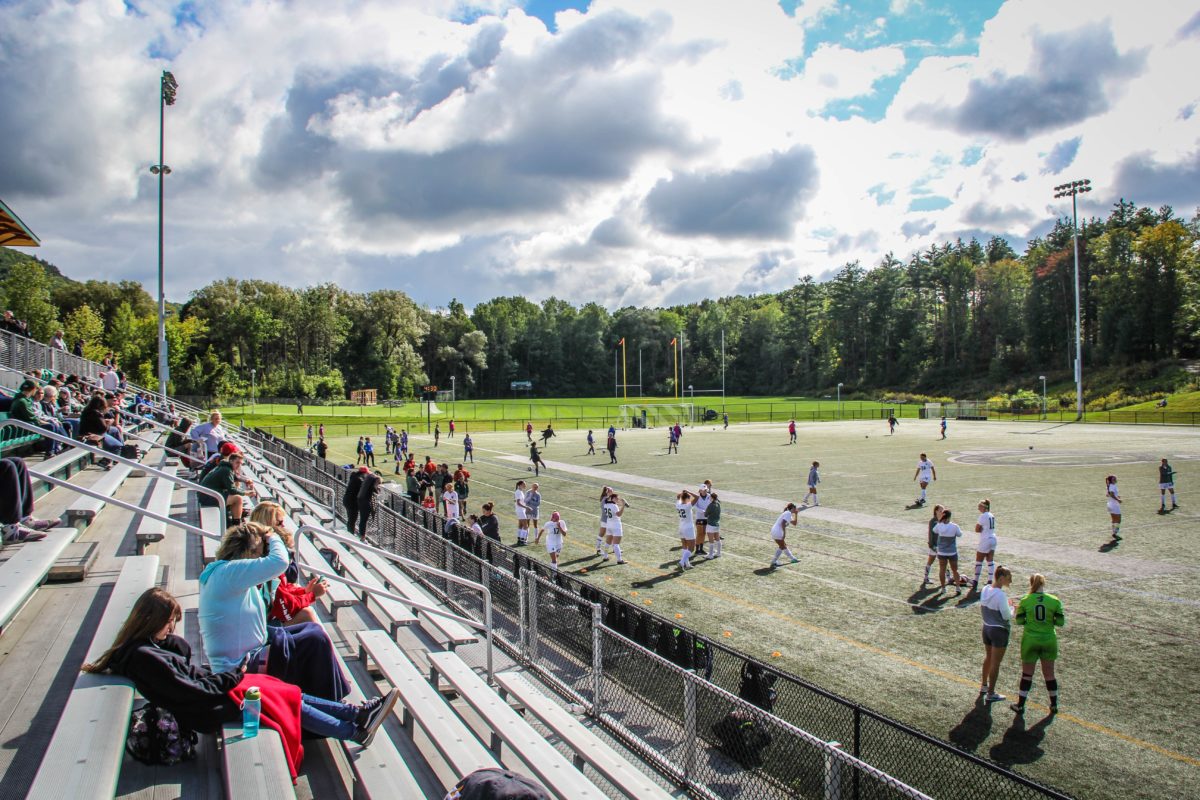Confessions of a Soccer Mom: The College Recruiting Process
The following is a submitted article from one of our amazing Hotspurs Moms — We asked her to share a bit of insight into what she learned in 3+ years of the college recruiting process with her athlete.
I am a soccer mom.
My daughter is a top-tier player in Western Pennsylvania. Like many youth athletes, she had a dream of playing in college — a dream that grew to be a driving force in her young life (and quickly took over much of mine after she entered high school). Flash forward 10 years — she proudly announced her commitment to play at the collegiate-level a few weeks ago, ending the recruiting process. Say it with me: PROCESS.
Make no mistake, for most players, the recruiting process will be a long and arduous one. Four years ago, we began the process, and I wish someone would have had an honest conversation with us before we moved forward. Here are five things I wish I had known at the start of 9th grade:
Honesty
 As parents, we want what’s best for our kids. Without honesty at the start of the recruiting process, you are setting your player up for failure. Honestly assess your players’ abilities both on the field and in the classroom. Then, research prospective schools. Do those items match up? If yes, add college to your prospect list. If not, cross it off and move on.
As parents, we want what’s best for our kids. Without honesty at the start of the recruiting process, you are setting your player up for failure. Honestly assess your players’ abilities both on the field and in the classroom. Then, research prospective schools. Do those items match up? If yes, add college to your prospect list. If not, cross it off and move on.
We weren’t completely honest when we started. Our daughter was focused on Big Ten, Patriot League, and the ACC universities, which aligned with her academic abilities but not so much on the field. This was the hardest thing to digest.
Academically, superior universities (like the above-mentioned) recruit based on the NCAA requirements not necessarily those set up by their admissions offices. This means, a GPA of 2.0 is all that is required. If a coach wants that student-athlete, they will “support” them through admissions.
Research
Get to know the schools and coaching style before your athlete starts writing letters. A lot can be learned by just looking at the roster.
If most players are taller than 5’7” and your player is only 5’2”, you may find (like we did) the coach will have decided she’s not a great fit on the sole basis of height. Physical profiling is as real as the freshman 15 for female athletes.
You’ll also want to know the style of play. Are they a possession team or do they tend to send long balls over the midfield and chase it down. If your player is a possession-style player, she may want to avoid the punt-and-chase programs and seek out those that work the ball out of the back. Most college team websites have video links to live stream or watch a previous game via web TV.
Correspondence
Communication is a key part of the process from the initial introduction letter stating interest to the day your player commits. We started with a list of approximately 30 universities D1 & D3. Our daughter emailed the entire recruiting staff monthly at the beginning, then every two weeks with game updates and video clips. (See example email below!) She copied her club coach on all correspondence for two reasons. For one, so he was aware of the schools she had interest in and also so he could follow up to reinforce her abilities and performance. (At times this seemed like a full-time job for all of us.)
College visits
Showcases are a great way for college coaches to see a lot of players in one place, which helps maximize their recruiting dollars. BUT they have limited time to spend watching any given player so it can be a crapshoot if the coach will show up and your player is actually on the field. If they are playing, your player might be having an off-day and that coach walks away with a not-so-positive impression.
 ID Clinics are the best way to show abilities for 4-6 hours in front the coaches you want to recruit you. When should you go to the ID clinics? Start early. We waited because we feared our daughter’s lack of height would be a negative in 8th and 9th grade.
ID Clinics are the best way to show abilities for 4-6 hours in front the coaches you want to recruit you. When should you go to the ID clinics? Start early. We waited because we feared our daughter’s lack of height would be a negative in 8th and 9th grade.
On the contrary, coaches know players will continue to develop and grow throughout high school. They like to see repeat camp visits to monitor and track growth both physically and technically. It was suggested very late for us to start with 5-10 camps: 2 reach programs, 5 that were inline with our player’s abilities, and 3 for which she’d be a shoo-in. This will allow you and your player to go home and accurately and honestly assess their performance within the standard of the group.
Understanding rejection
Unless your child is on the U14 national team…it’s inevitable. Your player will hear “NO” more often than “YES.” Prepare them early by taking the emotional aspects of recruiting out of the picture. Our daughter developed some very nice relationships with coaches along the way.
Toward the end of her process we needed to determine which universities were still viable and which were not. So she asked to have an honest conversation with each head coach about where she fit within their current systems. They set times to call her and in most cases explained that her ability to play would be limited. These calls were short and to-the-point, and very humbling.
There were tears and a lack of understanding because she thought the coaches really “liked” her. I’m sure they did like her, but I had to take the emotions out to explain to her why they could not move forward with a roster spot offer. I explained:
“To kids, soccer is still a game even at the college level. But to the coach, it’s a job. His/ her job is to recruit players (soccer employees) that will feed his bottom line (winning games). If your skillset doesn’t match the requirements to fulfill the job description (soccer position), then the coach cannot hire you (aka scholarship). It’s business — college athletics are a business.“
I’ll leave you with these final thoughts. Our focus changed as we waded through the muddy waters of the recruiting process. The more our daughter learned about what she wanted out of her college experience, the easier it became to focus in on schools.
Every player’s path is different, so try not to get caught up in another’s journey. Most people are not honest when it comes to this subject. Education was always first with a secondary-focus on playing soccer. Grades matter! D1 schools only get 14 full athletic scholarships to divide up every year. Good grades and test scores will go a long way with getting merit scholarships across all NCAA divisions.
I wish you the best and promise you will survive this process too!
– Hotspurs Soccer Mom
Example email to coach. **Keep in mind, this is an example — it’s important to do your research and customize your emails for each coach you’re reaching out to.**
Coach Smith:
I am Jane Doe, 2019 RB/RWB, from Pittsburgh, Pennsylvania. I am an attack-minded, possession style player who looks to make an impact in every game. One of my strengths as a player is my ability to service the ball from wide into the scoring third. I am undecided on a major but know that I seek a school that places a high focus on academics while allowing me to continue to play a sport I love. I feel Jon Smith University can provide both! A friend of mine, Susie Talbuddy, is a freshman and current “baller” on the women’s basketball team!
I just returned from the National Showcase in North Carolina where I had the opportunity to compete against three quality National League teams. My coach was pleased with my overall performance levels throughout the weekend, where I primarily played as a right outside back, in a 3-4-2 formation. I am working on video clips and will forward them when they are completed. I have listed my head coach’s information below in case you would like to reach out to them.
INSERT AWARDS and honors or attach separate soccer resume
Thank you for your time. I submitted a recruiting questionnaire and hope you can catch a game in Richmond while recruiting at this year’s Jefferson Cup.
Name, jersey number, position-grad year
team name
cell
Insert photo here
Head Coach: NAME
cell

This is excellent, thank you for sharing.
Thank you for putting out this information, just went through ” The process” as well. Not easy
Very true assessment. I would also add that you should really be cautious of some of the flim flan soccer coaches out there. We have also spent 4 years playing this game and watched the fast talking snake oil salesmen spit lies and untruthful statements. These coaches know how to “hook” young players and lead them on while they are not always forthcoming in their collaboration. You really need to keep an eye on the process and let your son/daughter do most of the communications but follow up periodically for clarity of the situation. If you have a “gut feeling” that something smells funny and see a red flag, go with your gut and call these coaches out. You are so correct. It is a business/job and don’t let these coaches play games. I made the mistake of witnessing a very successful Division 1 soccer coach lead my son on for 8 months and then send the “Dear John” letter. I guess it was better to hear the news before we made the mistake of signing with this program.
Sorry if your experience what you thought it Will’s be, but I think “snake oil salesman [who] spit lies” is overly dramatic and naive. At the end of the day, your kid can only pick one school and that coach is recruiting 100 (or more) players at once for 10 spots, so both people’s “interests” have to line up.
Our kids contact 10 different schools at once and show genuine interest in each of them, so why is it surprising when one coach seems super interested for a prolonged period and then all of the sudden isn’t when his plans A, B, and C come through and our kid was plan D?
It’s not personal; it’s a business for them—it’s literally their job. Granted, some coaches should be more forthcoming and honest with their evaluations and priorities, but if you take everything with a grain of salt and remain skeptical until you have a firm offer, you avoid a lot of heartache and the impression that some coaches are “snake oil salesmen” when they’re just doing their jobs.
This was a great assessment of the process. Our daughter just committed and we are glad to be done with the process at this point! It is stressful. We found was that by going to 15 different ID camps and just driving around campuses while doing soccer road trips, our daughter quickly found that for her, Power 5 schools were too big and she became more interested in smaller schools with better academics. It really is about finding what works best for your daughter and your family. You can’t compare yourself to others. It was easy to see our kid’s eyes light up when she found the school she loved and thankfully they made her an offer.